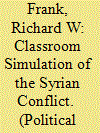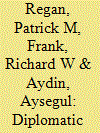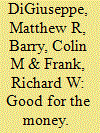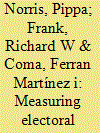| Srl | Item |
| 1 |
ID:
168729


|
|
|
| 2 |
ID:
085447


|
|
|
|
|
| Publication |
2009.
|
| Summary/Abstract |
Recent research in the civil war literature has focused on how and when external actors intervene. However, to date, systematic data have not existed on diplomatic efforts in conflict management. This article fills this gap and introduces a dataset on 438 diplomatic interventions in 68 conflicts stretching from 1945 to 1999. The authors briefly outline previous research on third-party interventions in civil wars, describe the dataset in some detail, including some initial patterns in the data, and describe how this dataset contributes to research into conflict processes.
|
|
|
|
|
|
|
|
|
|
|
|
|
|
|
|
| 3 |
ID:
113935


|
|
|
|
|
| Publication |
2012.
|
| Summary/Abstract |
Previous research indicates that a lack of state capacity is a key determinant of internal armed conflict. Scholars identify several internal dimensions of state capacity, but have yet to explore how international finance influences state resources. This is surprising because sovereign lending has increased dramatically in recent decades and plays an increasing role in the functioning of developed and developing governments. In this article, we explore this relationship between a state's integration into global credit markets and its subsequent capacity to promote domestic stability. We argue that international capital increases a state's ability to respond to internal opposition because states with favorable credit terms can expand their resource base beyond domestic constraints to deter, accommodate, or repress opposition while maintaining a level provision of resources to their political base. We examine the influence that both capital access and credit terms have on the risk of civil conflict in 141 countries from 1981 to 2007. Our empirical results indicate that states with affordable credit access are indeed less likely to experience civil conflict.
|
|
|
|
|
|
|
|
|
|
|
|
|
|
|
|
| 4 |
ID:
134795


|
|
|
|
|
| Summary/Abstract |
Many contentious elections end in disputes about alleged fraud, irregularities, and malpractices. How do we know when these claims are valid and when they are false complaints from sore losers? This article describes a new dataset developed by the Electoral Integrity Project. Based on a survey of election experts, the research provides new evidence to compare how national contests around the world are meeting international standards of electoral integrity. The questionnaire includes 49 key indicators clustered into 11 stages of the electoral cycle, as well as generating an overall summary Perception of Electoral Integrity (PEI) 100-point index. The evidence displays high levels of external validity, internal validity, and legitimacy. The PEI datasets allow researchers to gauge the perceived quality of elections worldwide. This study summarizes the PEI’s research design, compares the quality of elections around the globe, and illustrates how electoral integrity is linked with both democracy and development.
|
|
|
|
|
|
|
|
|
|
|
|
|
|
|
|